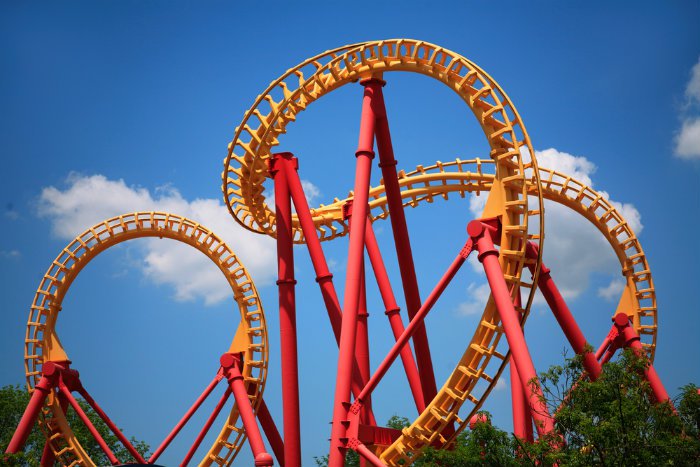Receiving an inflammatory bowel disease (IBD) diagnosis was like free admission to a carnival I could never leave. I know what to expect when I get on the familiar rides, but every turn is a new experience. At the concession stands, I pay an exorbitant amount of money for chemically processed and artificial morsels that will probably make me feel worse than the rides. And finally, playing games of chance and venturing into the fun house leaves me empty-handed and frustrated.
Symptoms: the carnival rides of IBD
IBD symptoms are like carnival rides. I’m mentally prepared for the adventure, but halfway through, I’m screaming, “Let me off!”
People unfamiliar with IBD may associate it only with diarrhea. But along with diarrhea, IBD patients experience multiple symptoms, including bloody stool, loss of appetite, weight loss, abdominal pain, fever, and fatigue.
My Crohn’s has mostly been like the smooth and predictable Ferris wheel. I’m able to maintain my daily routine with no problems. However, despite the steady rotation, I know there will be both high and low points.
Then, there are days — weeks even — when my Crohn’s is a roller coaster. During the first month of COVID-19 self-isolation, I experienced a severe Crohn’s flare brought on by stress and a change in routine. Every time I ate was like the uphill climb to the top, not knowing what was on the other side. Would it be a stomach-dropping wave of abdominal cramps? Or, would it be loop-de-loops of diarrhea and bathroom trips?
Remission is like a carousel adorned with twinkling lights, bright colors, and fantastical animals. I’m able to rest, listening to the calliope play a lighthearted tune. The ride may be brief, but it’s a welcome respite after the harrowing rides.
Side effects: the carnival fare of IBD
Pharmaceutical companies are the concession stands of IBD carnivals. They charge $5 for a $1 corn dog because they know carnival-goers have to satiate their hunger. The corn dog might alleviate a growling stomach temporarily, but it will probably cause a stomachache later.
The IBD medications that control Crohn’s and ulcerative colitis symptoms may cause a similar outcome. Sometimes, the side effects of some medications may be similar to or worse than IBD itself.
For example, gastroenterologists often treat IBD with the corticosteroid prednisone before prescribing stronger and more expensive biologics. Prednisone suppresses the immune system response that causes inflammation of the intestinal tract. Although the anti-inflammatory properties of prednisone ease IBD symptoms, the side effects can be much worse.
I can attest to the insomnia, mood swings, voracious appetite, weight gain, and water retention that accompany taking prednisone. Also, after long-term, high-dosage use, prednisone weakened my bones. I was diagnosed with osteopenia in my late 30s, putting me at risk for osteoporosis. Living with IBD is often a trade-off between symptoms and side effects.
Complications: the games and fun house of IBD
Carnivals are famous for the games of chance and the fun house. They’re another way to spend money, and players lose more often than they win. The same goes for IBD complications that bring additional symptoms and medications.
Complications are classified as local or systemic. Local or intestinal complications involve the intestinal tract. Systematic or extraintestinal manifestation (EIM) complications attack other parts of the body, such as the liver, kidneys, joints, skin, bones, and eyes.
Not all IBD patients will experience complications. If they do, some conditions are easier to treat and cure. Others are more serious and longer-lasting. I’ve suffered from intestinal and extraintestinal complications on both ends of the spectrum.
Early in my diagnosis, I had pyoderma gangrenosum, a skin lesion, which healed as soon as I began Remicade (infliximab) infusions. Also, I’ve taken supplements for vitamin A and E deficiencies caused by malabsorption.
Other problems remain a continuous battle. I still take iron supplements for anemia. I technically no longer have primary sclerosing cholangitis, an autoimmune liver disease, because of my liver transplant. However, because of Crohn’s, I stand a chance of the disease returning. In fact, my liver has been a source of aggravation recently.
With my transplant team not being able to pinpoint the cause of my elevated liver enzymes, I feel like I’m wandering around the fun house. Nothing is what it seems. Every corner I turn elicits fear or utter ridiculousness. Just when I think I’m headed toward the exit, a dead end forces me to turn around and find another way out.
The first step outside of the fun house is always a relief. And, while some games are impossible to win, the prize is worth the struggle for the victorious.
The midway
A person can only do so much before the carnival becomes repetitious and tiresome. Until scientists find a cure, IBD patients pace the midway, moving between symptoms, side effects, and complications.
***
Note: IBD News Today is strictly a news and information website about the disease. It does not provide medical advice, diagnosis, or treatment. This content is not intended to be a substitute for professional medical advice, diagnosis, or treatment. Always seek the advice of your physician or other qualified health providers with any questions you may have regarding a medical condition. Never disregard professional medical advice or delay in seeking it because of something you have read on this website. The opinions expressed in this column are not those of IBD News Today, or its parent company, BioNews Services, and are intended to spark discussion about issues pertaining to IBD.

